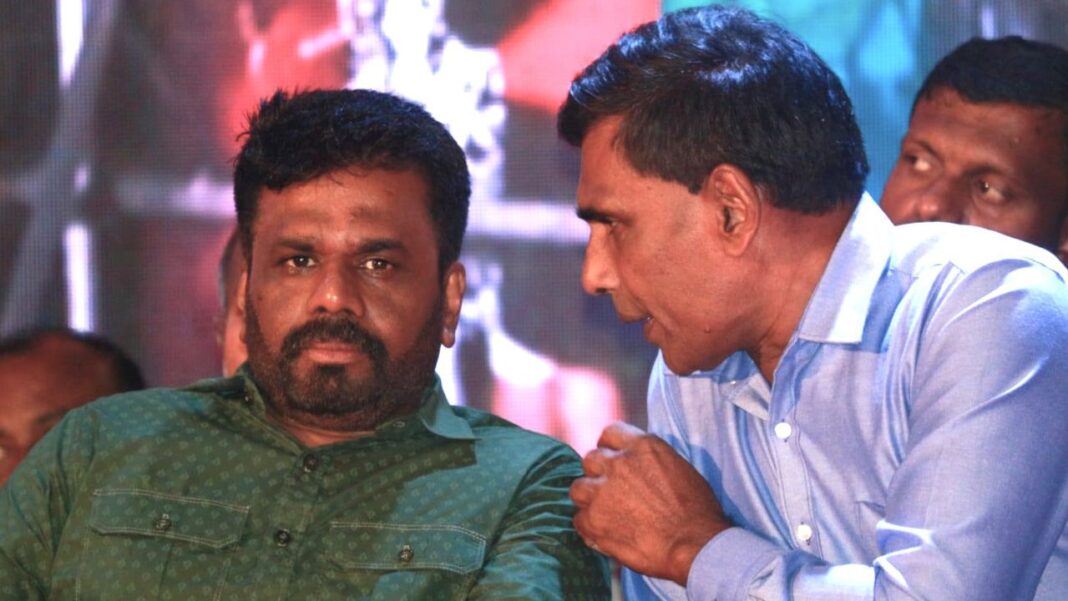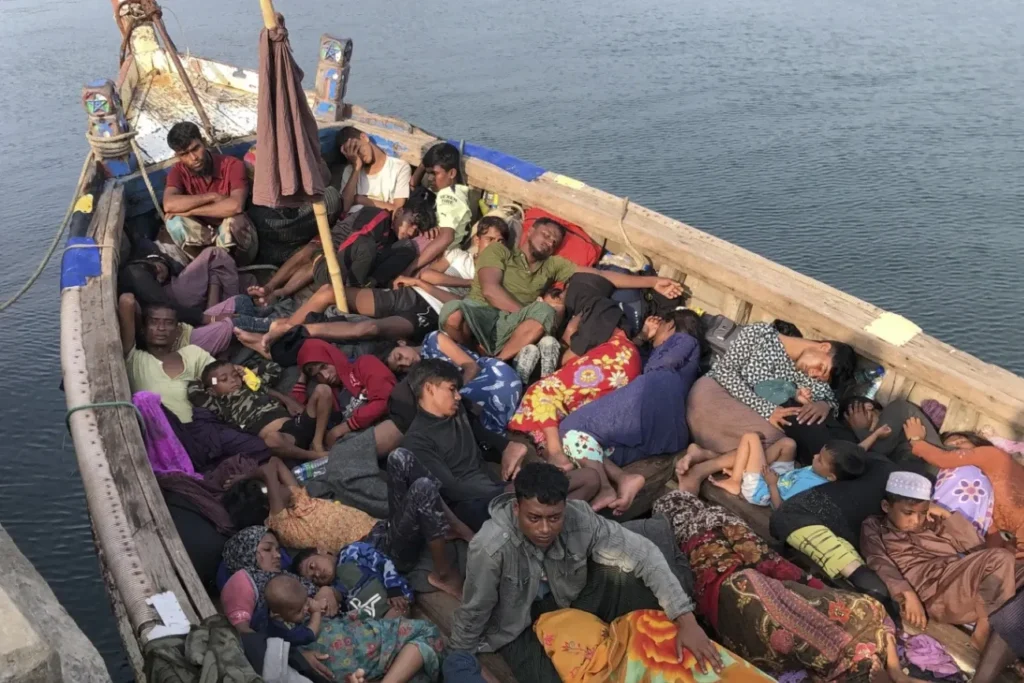Image: Public Security Minister Ananda Wijepala speaking with Sri Lankan President Dissanayake .
Although the Human Rights Commission of Sri Lanka (HRCSL) has urged the Government to provide the United Nations Refugee Agency – the UNHCR – with access to a group of Rohingya asylum seekers, the Government maintains that it does not see a need to do so presently as it considers the group as ‘illegal migrants.’
A total of 116 individuals belonging to the Rohingya ethnic community, a group of people who are unjustly persecuted in Myanmar, are currently awaiting their next court hearing at a Sri Lanka Air Force (SLAF) camp in Mullaitivu, having been first seen on Sri Lankan waters in December last year.
Speaking to The Sunday Morning, Public Security Minister Ananda Wijepala said the Government considered the group as “illegal migrants” and so did not see the need to provide access to the UNHCR to meet them at the moment.
“Without a court decision, we can’t decide. We haven’t considered them as asylum seekers yet; the court will decide,” he added.
However, refugee and human rights lawyer Lakshan Dias, PC, who is representing the group in court, said the court case was only to determine whether they had arrived in the country unlawfully.
“If they have arrived unlawfully, there is a punishment. But until such time, they are under the custody of the Department of Immigration and Emigration, kept in an SLAF camp. A policy decision from the State is needed as people can’t be kept at the Air Force camp indefinitely,” Dias told The Sunday Morning.
HRCSL statement
Earlier this month, the HRCSL too urged the Department of Immigration and Emigration to respond to the UNHCR’s request to access the asylum seekers expeditiously in order to enable the refugee agency to support the processing of the asylum seekers and determine their status.
“The use of the term ‘illegal migrants’ in contrast to ‘asylum seekers’ and the claim that the persons detained were not ‘asylum seekers’ because they may have entered Sri Lanka illegally reflects a misunderstanding of the concept of ‘asylum seeker.’ Any person who seeks asylum in another country may be appropriately termed an ‘asylum seeker,’” the HRCSL informed the authorities at a meeting on 8 May.
The meeting saw the participation of representatives from the Ministry of Public Security, Department of Immigration and Emigration, and SLAF.
The HRCSL also highlighted the obligation not to repatriate any persons to their home country when there is a risk of enforced disappearance. This was not only an international obligation but was also “clearly found” in Sri Lanka’s domestic law in Section 18(1) of the International Convention for the Protection of All Persons from Enforced Disappearance Act of 2018, the HRCSL said in a statement following the meeting.
“Therefore, the Rohingya asylum seekers cannot be repatriated without a clear evaluation of the risks of enforced disappearance they face in their home country,” it said.
Humanitarian and health assistance
Presently, only the HRCSL and health-related stakeholders have been granted access to the asylum seekers.
The International Committee of the Red Cross (ICRC) in Sri Lanka visited the displaced people on 29 April with the objective of reconnecting them with their families abroad, the ICRC team informed The Sunday Morning via a written statement last week.
“During the visit, 44 short messages were collected to be relayed to their family members in other countries through the coordination of the ICRC. The ICRC continues to maintain a bilateral dialogue with relevant authorities on the humanitarian aspects related to the observations made during the visit,” the ICRC statement further said.
The HRCSL has recommended that relevant State institutions that can address the specific needs and vulnerabilities of children and infants at the detention centre, like the Northern Provincial Department of Probation and Child Care Services and the Children’s Secretariat, be provided access to the centre without delay.
“Section 5 of the International Covenant on Civil and Political Rights Act of 2007 clearly obliges all State authorities to give paramount importance to the best interests of children and that this legal obligation extends to all children within Sri Lanka’s jurisdiction, regardless of their citizenship status,” the HRCSL said.
Furthermore, the HRCSL has stressed the importance of improving access to health services, including reproductive health services, recommending collaboration with the provincial Department of Health Services in the Northern Province. The authorities have reported that the Office of the Medical Officer of Health conducts regular inspections to monitor hygiene standards and prevent disease outbreaks.
Additionally, the HRCSL has urged the Department of Immigration and Emigration to increase the number of female Police officers stationed at the centre to enhance the protection and welfare of female detainees and children. Further discussions were held on deploying female Police officers after 10 p.m. to improve safety of women.
Current fate of the asylum seekers
Termed as one of the largest stateless populations in the world by Human Rights Watch, the Rohingya people have faced decades of brutal suppression under successive Myanmar governments. Many Rohingyas who fled Myanmar in 2017 to escape its military’s alleged crimes against humanity are currently living in a congested refugee camp in Bangladesh.
Rohingya refugees have come to Sri Lanka too on multiple other occasions since 2007, and the country has hosted about 300 in total according to reports. Many have found permanent residency elsewhere after the UNHRC granted them refugee status, leaving about 100 currently living here.
The latest boat of Rohingya people were seen off Mullaitivu shores on 19 December 2024 and were brought to land by the Sri Lanka Navy. After spending three days in a school in Trincomalee, they are now being detained at an SLAF camp in Mullaitivu.
The Department of Immigration and Emigration is responsible for the camp, which has been gazetted as a permanent detention centre. The Sri Lanka Police is responsible for providing security within the centre and SLAF officials are only responsible for regulating entry into the camp premises. Aid can be directed to the asylum seekers by contacting the Immigration Department.
Multiple attempts to contact Department of Immigration and Emigration Additional Controller General Imal Gunawardena and Information Officer K.M.S.M. Chathurangi proved futile.
By Pamodi Waravita / The Morning

